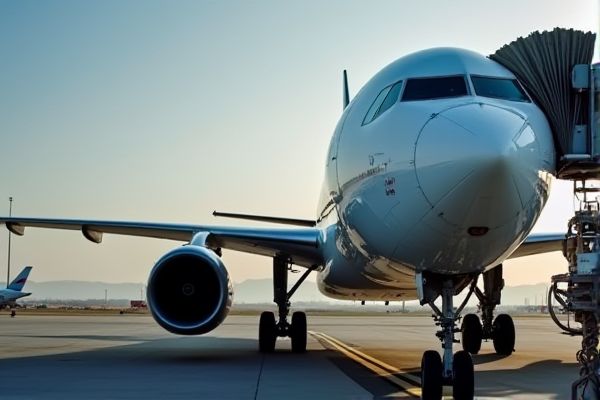
Nigeria's aviation sector offers a growing demand for skilled aircraft maintenance professionals due to increasing air traffic and fleet expansion. Roles typically include aircraft mechanics, avionics technicians, and maintenance planners, emphasizing the need for certification and specialized training. Organizations such as the Nigerian Civil Aviation Authority offer guidelines for necessary qualifications, while numerous aviation schools provide relevant programs. Moreover, airline companies and maintenance, repair, and overhaul (MRO) facilities actively seek candidates, enhancing job prospects in the industry.
Job Description
Aircraft maintenance professionals in Nigeria ensure the safety and airworthiness of various aircraft, including commercial airliners and private jets. Their responsibilities encompass routine inspections, repairs, and the replacement of parts to comply with local aviation regulations set by the Nigerian Civil Aviation Authority. Expertise in technical manuals and an understanding of aircraft systems are essential for diagnosing and resolving issues effectively. Strong communication skills are also necessary for collaborating with flight crews and other maintenance personnel to ensure efficient operations and high safety standards.
Requirement
To pursue an aircraft maintenance job in Nigeria, you typically need a recognized degree or diploma in aeronautical engineering or a related field. Relevant certifications from the Nigerian Civil Aviation Authority (NCAA) are essential, demonstrating your compliance with safety and regulatory standards. Gaining hands-on experience through internships or apprenticeship programs can enhance your suitability for roles in airlines and maintenance organizations. Staying updated with technological advancements and procedures in the aviation industry is crucial for success in this competitive field.
Salary and Perks Expected
In Nigeria, the salary for aircraft maintenance personnel varies based on experience, qualifications, and the type of employer, with entry-level positions typically earning between 120,000 to 180,000 naira monthly. Skilled technicians, especially those with certifications, can command salaries ranging from 250,000 to 500,000 naira per month, particularly in larger airlines and maintenance firms. Perks may include health insurance, annual leave, and opportunities for further training and certification, which enhance your career prospects. Overall, the aviation sector offers a competitive compensation package that reflects the specialized skills required in aircraft maintenance.
Similar Job Names
- Aircraft Maintenance Engineer
- Avionics Technician
- Airframe Maintenance Technician
- Powerplant Technician
- Line Maintenance Engineer
- Quality Assurance Inspector
- Aircraft Maintenance Planner
- Heavy Maintenance Technician
- Aircraft Maintenance Supervisor
- Maintenance Control Officer
- Technical Records Specialist
- Engine Technician
- Sheet Metal Technician
- Composite Technician
- Safety Assurance Manager
Job Expectation Concept
The job expectation concept of aircraft maintenance in Nigeria revolves around ensuring safety, efficiency, and compliance with international aviation standards. Professionals in this field are expected to maintain technical proficiency and stay updated with evolving regulations and technologies. Your role may involve routine inspections, troubleshooting, and repairs of aircraft systems, which are crucial for maintaining the fleet's airworthiness. With the growing aviation industry in Nigeria, demand for skilled aircraft maintenance personnel continues to rise, presenting numerous career opportunities.
Career Advantage and Weakness
A career in aircraft maintenance in Nigeria offers significant advantages, such as a growing aviation sector that demands skilled technicians and mechanics, leading to ample job opportunities. You can benefit from high earning potential and the chance to work with advanced technology and equipment. However, the field also presents challenges, including the need for ongoing training and certifications to keep up with international standards, which can require both time and financial investment. Additionally, the industry can be affected by economic fluctuations and regulatory changes, impacting job stability in certain periods.
Important Thing Must Know
Aircraft maintenance jobs in Nigeria require a solid understanding of aviation regulations set by the Nigerian Civil Aviation Authority (NCAA) and adherence to international standards. Continuous education and training are essential to stay updated on new technologies and maintenance practices, which enhances your employability. Familiarity with various aircraft types and their specific maintenance needs is crucial, as is proficiency in using diagnostic and troubleshooting equipment. Networking within the aviation industry can open doors to job opportunities and collaborations, contributing to professional growth. A commitment to safety and quality is paramount, ensuring that aircraft remain airworthy and compliant with safety standards.
Alternative Career Options
The Nigerian aviation sector offers diverse alternative career options for those with aircraft maintenance experience. Positions such as aviation safety inspector, airline operations manager, or technical services engineer leverage your technical skills while expanding into management or regulatory roles. Emerging fields like drone maintenance and unmanned aerial vehicle (UAV) support are gaining traction, presenting new opportunities for skilled technicians. Exploring roles in aerospace manufacturing or aviation consultancy can also enhance your career trajectory within the industry.
Companies List
- Aero Contractors, Arik Air, Air Peace, Bristow Nigeria, Total Helicopters, Caverton Helicopters, Nigerian Air Force, and Nigerian Navy.
List of Ideal City
Lagos is a bustling metropolis and the primary hub for aviation in Nigeria, hosting numerous airlines and maintenance facilities. Abuja, as the capital city, offers expanding opportunities in the aviation sector, with government regulations supporting the industry. Port Harcourt, known for its oil and gas industry, also has growing prospects for aircraft maintenance due to the rising demand for helicopters and fixed-wing aircraft in that region. Enugu, with its accessibility to several regional airports, presents an emerging market for aviation services, making it a noteworthy option for your career in aircraft maintenance.
 jobs-nigeria.com
jobs-nigeria.com